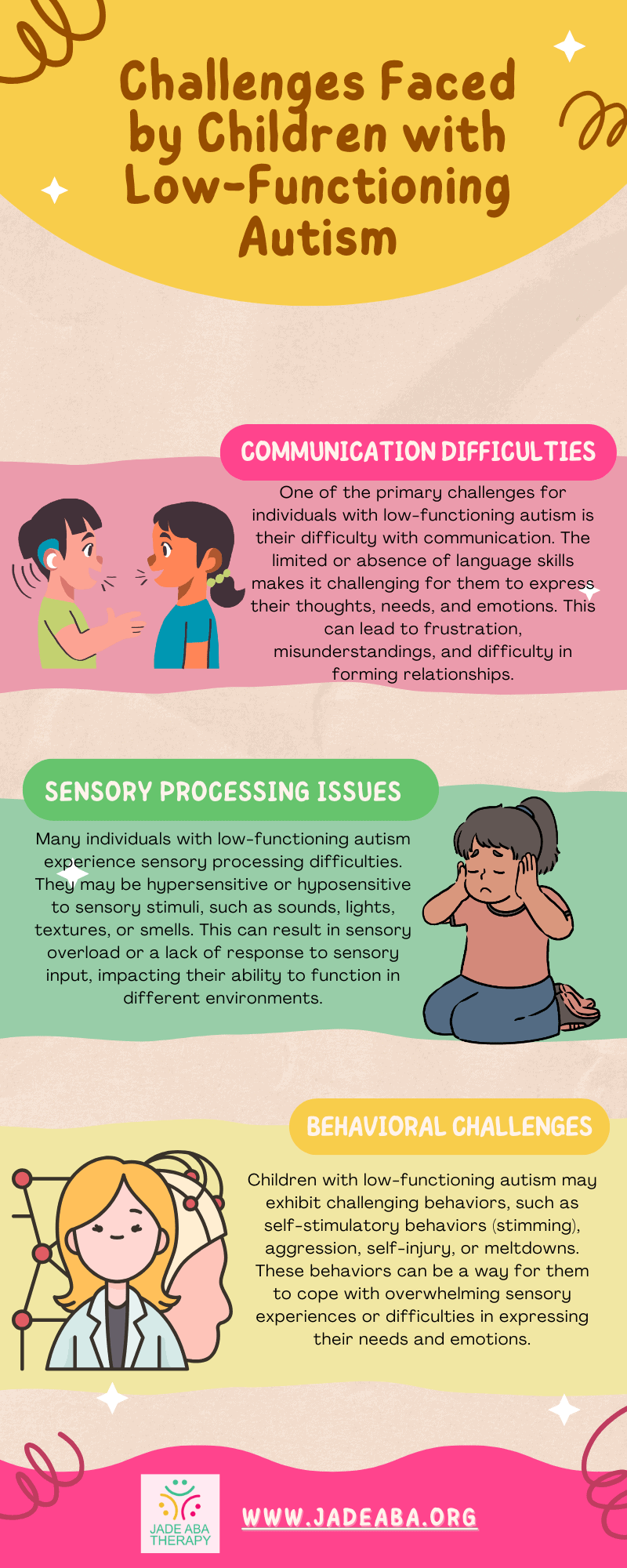Low-functioning autism is characterized by significant impairments in multiple areas of development. Those who have low-functioning autism experience immense difficulty socializing, speaking, and communicating non-verbally. They often struggle with impulse control and sensory processing difficulties, and they may exhibit symptoms associated with obsessive-compulsive disorder.
Moreover, it can be difficult for kids with low-functioning autism to communicate their needs and have meaningful conversations because they have limited or nonexistent language skills. They might rely on alternate forms of expression like pictures, gestures, or assistive technology.
In terms of severity, low-functioning autism is considered to be at level 3 on the autism spectrum.
In case you’re wondering, level 3 is associated with the highest support needs and significant impairments in social communication and daily functioning. As such, individuals with low-functioning autism find it very hard to complete day-to-day tasks and require high levels of support.

Educational and Developmental Impacts
Low-functioning autism can have significant impacts on a child’s education and overall development.
The absence or minimal use of language is one of the hallmarks of low-functioning autism. This means that it may be challenging for kids with low-functioning autism to acquire verbal communication skills, which makes it challenging for them to express their needs, wants, and feelings.
This can result in frustration and challenges in social interactions.
It is crucial to remember, though, that a lack of language proficiency does not equate to a lack of intelligence. Many people with low-functioning autism have special talents and qualities that might be challenging to evaluate using conventional intelligence tests.
To support individuals with low-functioning autism in developing communication skills, alternative forms of communication such as sign language, picture exchange systems, or augmentative and alternative communication (AAC) devices can be utilized.
These alternative methods can help bridge the communication gap and enable individuals to express themselves effectively.

Educational Barriers
Children with low-functioning autism also often face significant barriers in accessing educational opportunities. Due to their communication difficulties, memory impairment, and hypersensitivity, they may require individualized educational programs tailored to their specific needs.
These programs may involve specialized teaching methods, visual supports, and structured routines to create a conducive learning environment.
In addition, children with low-functioning autism may require additional support from special education professionals who have experience working with individuals on the autism spectrum. These professionals can provide the necessary accommodations, modifications, and interventions to help individuals with low-functioning autism reach their educational goals.
Physical Challenges
Alongside the cognitive and social challenges, individuals with low-functioning autism may also experience physical challenges. Some children with low-functioning autism may have below-average height, weight, and skeletal maturity.
It is important to monitor these physical aspects of development and address any concerns with healthcare professionals.
Furthermore, children with low-functioning autism may exhibit symptoms associated with obsessive-compulsive disorder and struggle with impulse control. These challenges can impact their ability to engage in daily activities and may require additional support and intervention strategies to manage these behaviors effectively.
Challenges Faced
Children with low-functioning autism face a range of challenges that can significantly impact their daily lives. These challenges may include the following:

Understanding the definition and severity, as well as the challenges faced by individuals with low-functioning autism, is crucial for effective support and intervention. By recognizing and addressing these challenges, caregivers and professionals can provide the necessary support and resources to help individuals with low-functioning autism lead fulfilling and meaningful lives.
Co-morbid Conditions Associated
In addition to the challenges faced by individuals with low-functioning autism, there are often co-morbid conditions that are commonly associated with this form of autism.
These co-morbid conditions can further impact an individual’s development and overall well-being. Let’s look at each of them in further detail.
Fragile X Syndrome
Fragile X syndrome is a genetic disorder that is often co-morbid with low-functioning autism. It is caused by a mutation in the FMR1 gene, which affects the production of a protein necessary for brain development.
Individuals with Fragile X syndrome may experience intellectual disabilities, developmental delays, and behavioral challenges.
The prevalence of Fragile X syndrome in individuals with low-functioning autism is notable. Studies have shown that a significant proportion of individuals with low-functioning autism also have Fragile X syndrome.
Early diagnosis and intervention are crucial in managing the challenges associated with this co-morbid condition.

Tuberous Sclerosis
Tuberous sclerosis is another co-morbid condition commonly found in individuals with low-functioning autism. It is a genetic disorder characterized by the growth of noncancerous tumors in various organs of the body. These tumors can affect the brain, leading to seizures, intellectual disabilities, and behavioral difficulties.
The co-occurrence of tuberous sclerosis and low-functioning autism has been well-documented.
Research indicates that a substantial number of individuals diagnosed with low-functioning autism also have tuberous sclerosis. Early identification and comprehensive medical care are essential in managing the symptoms and providing the necessary support for individuals affected by this co-morbid condition.
Epilepsy
Epilepsy is often seen as a co-morbid condition in individuals with low-functioning autism. Epilepsy is a neurological disorder characterized by recurrent seizures. Seizures can vary in type and intensity, and they can have a significant impact on an individual’s daily life and overall functioning.
The prevalence of epilepsy in individuals with low-functioning autism is higher compared to the general population. It is crucial for individuals with low-functioning autism to receive appropriate medical care, including regular monitoring and management of their epilepsy.
This can help minimize the impact of seizures and improve overall quality of life.

Support Needs for Individuals
Individuals with low-functioning autism typically require significant support and care to navigate daily life.
Children and adults with low-functioning autism often require constant surveillance and care due to the challenges they face in communication, social interaction, and daily living skills.
They may have limited or no language skills, making it difficult for them to express their needs and understand verbal instructions. Their ability to operate independently may be severely impaired, necessitating supervision to ensure their safety and well-being.
The level of support needed varies depending on the individual. Some people with low-functioning autism might need help with daily self-care activities like getting dressed, taking a shower, and feeding themselves. Others might require assistance in handling difficult behaviors or sensitivities.
As caregivers, it’s important to be vigilant and proactive in addressing the unique needs of individuals with low-functioning autism.
Tailored Treatment Options
Tailored treatment options are essential for individuals with low-functioning autism. These treatments should be designed to address their specific challenges and promote their overall development.
A multidisciplinary approach involving professionals from various fields, such as speech therapy, occupational therapy, and behavioral therapy, can be beneficial in providing comprehensive support.
Some of the most effective treatment strategies for individuals with low-functioning autism may include:
- Applied Behavior Analysis (ABA) – ABA therapy focuses on teaching new skills and reducing challenging behaviors through positive reinforcement and systematic behavior modification techniques.
- Communication and Social Skills Training – People who have low-functioning autism frequently have difficulty interacting socially and communicating. They can enhance their social skills and acquire alternate forms of communication with the aid of speech therapy and social skills training.
- Sensory Integration Therapy – Shortcomings in sensory processing are common in people with low-functioning autism. Sensory integration therapy aims to help individuals regulate their responses to sensory stimuli and improve their sensory processing abilities.
- Individualized Education Programs (IEPs) – IEPs are personalized plans that outline educational goals and strategies for individuals with special needs. These programs ensure that individuals with low-functioning autism receive appropriate educational support and accommodations.
Caregivers and experts can provide low-functioning autistic people with the support they need to speed up their development, improve their quality of life, and realize their full potential by customizing treatment plans to fit their specific needs.
It is crucial to consider individual strengths, challenges, and preferences when developing and implementing treatment plans for individuals with low-functioning autism.
Sources:
https://study.com/academy/lesson/low-functioning-autism-definition-characteristics.html
https://www.verywellhealth.com/high-and-low-functioning-autism-260599
https://www.autismparentingmagazine.com/low-functioning-autism
https://parenting.firstcry.com/articles/understanding-low-functioning-autism-or-profound-autism